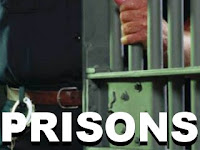 12-15-2014 Rhode Island:
12-15-2014 Rhode Island:
CRANSTON — To reach D-mod, a specialized unit at the High Security Center of the Adult Correctional Institutions, you must pass through a series of steel doors manned by guards inside fortified control booths. You must be escorted by at least one correctional officer — on this day, William Galligan, a lieutenant. Louis A. Cerbo, the Department of Corrections’ clinical director, joins him on a tour.
Each of D-mod’s 12 cells holds a single prisoner. Each cell has cinder-block walls, a high ceiling, one fluorescent light, a camera, a tiny window facing outside, a larger window facing in, and a bunk and steel toilet/sink fixture, both bolted to the concrete floor. The metal mirror, warped by age, distorts your reflection. The total floor space of each cell is 76 square feet. There are no radios, televisions, or computers. It is eerily quiet, except when someone is in crisis.
A small number of D-mod inmates, diagnosed with severe mental illness, spend most of their days alone in these cells.
During the hour or sometimes more that they are out, they take outdoor “recreation” in steel cages, watch a group TV, visit the library or classroom, or receive counseling and related services. When they shower, liquid soap is poured into their palms, since a bar could be used to attempt self-asphyxiation, or, wrapped and swung in a towel, used as a weapon.
These men on D-mod, home of the Observation and Stabilization Unit, are among the sickest people at the ACI.
Galligan says their care has improved since Cerbo was hired in late 2011: correctional officers have undergone training and they belong to mental-health teams created by the clinical director. Galligan says his job these days includes what he calls “a social-worker aspect.”
“We don’t throw them in a cell and forget them,” he says. “We try to make it a little bit better, rather than exacerbate the situation. We get them medicated, we get them compliant, we get them stabilized.”
“We work together,” Cerbo says. “We have to understand their perspective and they have to understand ours.”
The same approach, says Cerbo, is used elsewhere at the ACI, including in High Security’s other modules. According to department spokeswoman Susan Lamkins, 17 of High Security’s 94 inmates, as of last Monday, were classified as “high risk” — men diagnosed with schizophrenia, post-traumatic stress disorder and other severe disorders who have exhibited unruly, self-injurious or suicidal behaviors. Another 31 were classified as “moderate to low-risk mentally ill offenders.”
Treatment teams include doctors, social workers, and education and discharge-planning specialists, according to Cerbo. ..Continued.. by G. WAYNE MILLER, JOURNAL STAFF WRITER
December 15, 2014
R.I. prison system lacks resources to care for mentally ill inmates
Subscribe to:
Post Comments (Atom)

No comments:
Post a Comment